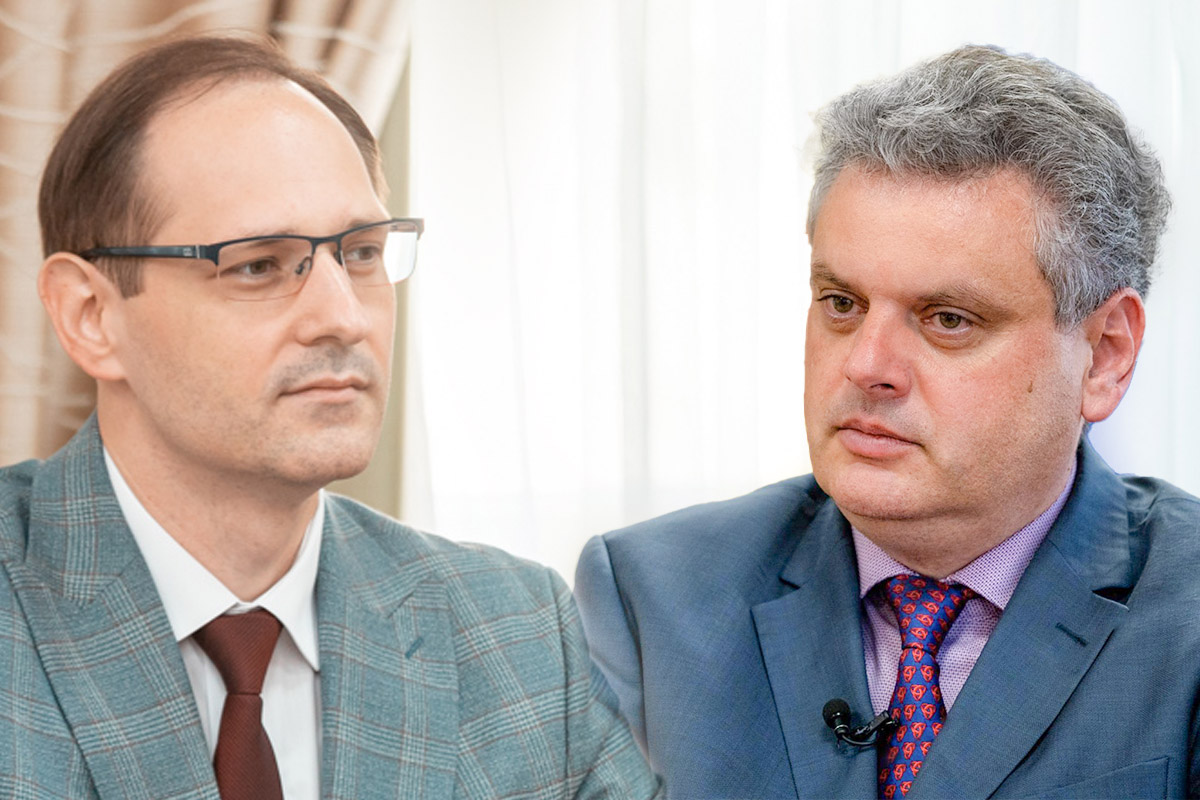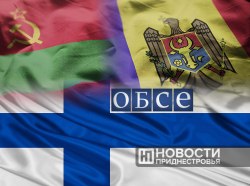Tiraspol, January 19. /Novosti Pridnestrovya/. After the meeting of political representatives of Pridnestrovie and Moldova, which took place this week, both Vitaly Ignatiev and Oleg Serebryan commented on its results to the press. Oleg Serebryan then held a separate briefing in Chisinau.
The political representative of the Republic of Moldova reported that in Tiraspol, among other things, the issue related to land use in the Dubossary region of Pridnestrovie, where Moldovan farmers rent farmland, was raised. In fact, during the negotiations that took place, surprisingly, Oleg Serebryan never really raised this issue, with the exception of his opening remarks. This was confirmed to journalists by Vitaly Ignatiev. “This issue was highlighted, but we did not discuss it,” he said after Tuesday’s meeting.
Regarding the farmers, we note that they cultivate their lands as they had done before, and they would continue to cultivate it. But when exporting products, they will now begin to make customs payments on an equal basis with Pridnestrovian agricultural producers.
Oleg Serebryan`s Estimates
The main and most difficult topic at the negotiations was, of course, the discussion of duties for Pridnestrovian enterprises that appeared on January 1. At the briefing, Oleg Serebryan tried to present it in such a way that, in fact, the new duties are some kind of nominal, almost trivial expenses for Pridnestrovie.
Speculating, he gave the following estimates: the duties will cost enterprises from the PMR 100-120 million lei (that is, 5.5-6.5 million dollars) per year. The Moldovan political representative recalled that since August 2023, Pridnestrovian enterprises have already paid for customs clearance in the Republic of Moldova. If they paid for this all year (quite a strange theorizing), and not just from August, then the total amount would be 60-70 million lei.
According to the new Customs Code, there are no fees for customs clearance. Yet there are duties. Oleg Serebryan says that they are higher. But, according to him, they are not much higher - by 50 million lei (120 - 70 = 50), that is, only by 2.5-3 million dollars a year.
What's Wrong with All This?
What we have before us is an elementary and rather poorly arranged speculation. What's wrong here? First: the fee for customs clearance was also introduced by Moldova in violation of all agreements between Tiraspol and Chisinau. That is, it should not have existed. The Moldovan political representative presents the case as if this payment was something natural, and in fact proposes not to consider 70 million lei as direct damage to Pridnestrovie. Yet they must be taken into account. That is, you need to start from the minimum figure calculated by the Moldovan side of 5.5 - 6.5 million dollars.
Second: how realistic is this minimum figure? In the very first days of the new year, when the situation was still completely unclear, in Pridnestrovie they also assessed the possible damage in approximately the same way. However, at the meeting of political representatives, the State Customs Committee of the PMR presented updated data - 16 million dollars in losses per year, while even taking into account the duty-free trade zones with the EU, CIS countries and Turkey that Moldova has.
This estimates were made without taking into account the import of sugar, for which in Moldova, in excess of a certain quota (this quota does not take into account the needs of Pridnestrovie), a protective duty of 70% of the price was established.
But that may not be all there is to it. In order to take advantage of the duty-free trade regime, you need to have the appropriate certificate - ST-1 for the CIS countries and Euro-1 for the EU and Turkey. The question is that those Pridnestrovian enterprises that do not have the opportunity to open a bank account in Moldova and enter into contracts not directly, but through intermediaries, cannot receive these certificates. This means that they will not have any exemption from duties. This is actually a big problem that can greatly affect the amount of damage that Pridnestrovie will receive in the end. Most likely, even the State Customs Committee's forecast of 16 million will be underestimated in this case.
That is, the banking blockade against the PMR, which intensified in 2019 and which Oleg Serebryan somehow lost sight of, greatly aggravates the negative effect of customs duties. The losses will definitely not be at the level of 2.5-3 million dollars, as was calculated in Moldova. And not even at the level of 5.5 - 6.5 million.
An additional problem may arise if Chisinau leaves the free trade zone with the CIS. Such an option is possible, given the current accelerated dynamics of Moldova’s denunciation of agreements within the Commonwealth. While Oleg Serebryan made an interesting reservation at the briefing, saying that “the agreement on a free trade zone with the CIS has not yet been annulled.” If this happens, there will be tariffs on trade with Commonwealth countries for everyone.
Regarding the question where the customs payments of PMR enterprises will go, the Moldovan political representative said that they return to Pridnestrovie through medical services and pensions.
“Last year, 50 thousand residents of Pridnestrovie received medical services on the right bank. We have a lot of pensioners, although there is no exact figure yet, but these are probably tens of thousands of citizens who receive pensions on the right bank, but live on the left bank,” he said.
It's difficult to comment on anything here. To receive medical services in Moldova, residents of Pridnestrovie must either pay their cost (as most often happens) or buy a health insurance policy. This has nothing to do with the Moldovan budget. It is also completely unclear where Oleg Serebryan sees “tens of thousands” of Moldovan pensioners in the PMR. This is at best up to two thousand people. Many of them are former employees of various Moldovan institutions in Bendery and Dubossary.
Russia actually has tens of thousands (almost 50 thousand, according to the latest data) of pensioners in Pridnestrovie. But no one in the Russian Federation takes any bribe from Pridnestrovian enterprises under this pretext.
And if we are talking about medical services, then we also need to remember that the PMR Ministry of Health spends about 35 million rubles (more than 2 million dollars) of budget funds on the treatment of Pridnestrovians in Moldova annually. This is real money that the PMR actually pours into Moldovan healthcare and which can be perceived and measured. What Oleg Serebryan is talking about is nothing more than speculation.
If Chisinau is Not Stopped, Pridnestrovie will Face New Bans and Extortions
In general, if we sum up the last meeting`s results, the representatives of Chisinau again did not give clear prospects for solving existing problems. Yet there have been weak points, new threats formulated. Thus, Oleg Serebryan stated that “we /Moldova/ do not yet levy excise taxes and value added tax” from Pridnestrovian enterprises. This “yet” may indicate that the Moldovan authorities have a specific plan, and if Chisinau is not stopped now, then Pridnestrovie will wake up with new exactions one of these days. Just like it happened on January 1.
Let us note that partially Moldovan excise taxes are already applied - on cigarettes and alcohol, which are imported into the PMR through Moldova. In fact, VAT is also selectively applied when medicines are purchased in the Republic of Moldova.
The Moldovan political representative was even more specific regarding vehicles with Pridnestrovian license plates. He said that from January 1, 2026, the passage of such vehicles into Moldova will be prohibited. Moldova plans to resume the mechanism for issuing neutral license plates (it is not yet clear when exactly), but only until the end of 2025.
At the same time, even references to the 2018 protocol decision on neutral license plates had no effect on Oleg Serebryan. And it clearly states that the movement of cars with Pridnestrovian license plates on roads in the Republic of Moldova should go without restrictions (and there were never any time limits in the protocol decision either).
The export of Pridnestrovian machine-building enterprises is still in limbo. Their leaders were at the meeting of political representatives and gave specific examples that indicate the absurdity of the current situation. Thus, it is not clear by what criteria Moldova can refuse an export permit. Elektromash, for example, was not approved for the supply of equipment for a power plant in Estonia, which is an EU country. Moreover, the commission that issues permits has not met for more than a month.
The problem remains the import of X-ray equipment into Pridnestrovie - even that provided to the republic by the Global Fund to Fight AIDS, Tuberculosis and Malaria. Parts for the X-ray machine are delayed at the Republican Dental Clinic. While Chisinau offers some ridiculous options here: for example, register a separate office where there is an X-ray machine as a private company in Moldova, and this company, they say, will receive authorization to use the equipment.
The problem with the import of medicines has now taken on a new dimension. In 2022, the decision of the Moldovan Commission for Emergency Situations managed to include a clause according to which Pridnestrovie could import a small list of vital medicines, purchasing them in Russia or Belarus. This helped, especially Pridnestrovian hospitals.
Now the state of emergency in Moldova has been lifted, the CoES no longer exists and, accordingly, its decisions have lost force. Therefore, Pridnestrovie cannot yet independently import medicines even according to the small list that was available before. We can only hope that, at least when it comes to healthcare, common sense will prevail and solutions will be found. Although there is not much hope yet.
Vladimir Dmitriev








